On the morning of August 23rd, a quiet energy filled the campus. We were preparing for a rally, a silent protest, to stand in solidarity for equality and justice after yet another horrifying rape case. The Nukkad Natak, titled Awaaz Utha—Raise Your Voice—by Team Bedaari was set to precede the rally. It wasn’t just a performance; it was intended to stir something profound within us.
As we set the stage on the college grounds, students gathered, curiosity piqued. The air was thick with anticipation, yet a strange calm settled over us. This wasn’t just another college event; it felt heavier, deeper. I knew the stories Team Bedaari was about to tell weren’t just performances—they were reflections of reality, experiences lived by so many women. I had the solemn task of setting the scene before the performance to the audience. Having witnessed the play beforehand, I was aware of its emotional weight, though I could not predict how it would be received.

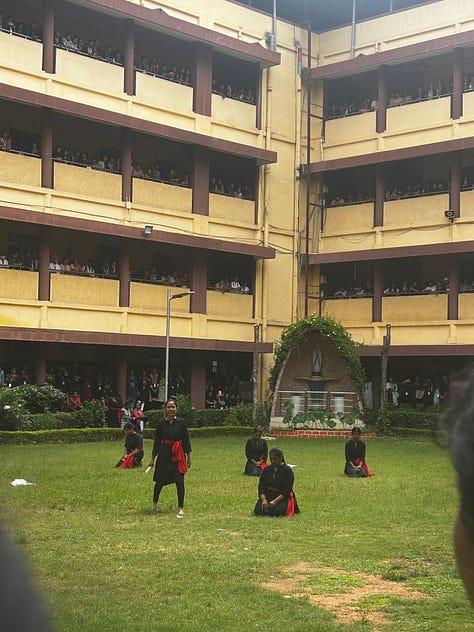
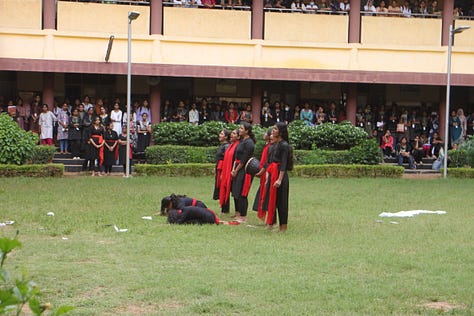
The first story in the Nukkad Natak was about a girl with dreams of studying, a girl who believed education was her path to freedom. But ‘men’ or society—rooted in age-old beliefs—dismissed her ambitions, accusing women like her of causing societal imbalance. They said women should not dream so boldly; they should stay within the confines of what was deemed “acceptable.”
The second story was harsher, more brutal. It depicted a woman who dared to reject a marriage proposal because she wanted more from life—more than settling down, more than what was expected of her. For her defiance, she was raped. Punishment for wanting more and for daring to reject a man, hurting his ego. The performance was raw, unsettling. When the actor portraying the victim screamed as the crime was committed, the sound reverberated through the air, sharp and piercing, cutting through the silence like a blade.
This moment felt like a mirror to everything I’ve experienced, everything we’ve all lived through. The truth is, every woman I know has her own story of harassment or fear whispered in friend groups. The fear is always there, lurking in the back of our minds, woven into our daily routines. Why should we have to constantly look over our shoulders just for existing? Why do we have to be afraid of our own streets after the sun sets?
Two weeks ago, the horrifying rape and murder of a medical student at Kolkata's RG Kar Medical College reignited these questions. It’s not that we didn’t know this brutality existed—every headline seems to serve as a grim reminder. But the pain of each new case feels like a fresh wound. It stirs something deep inside, a mixture of grief and fury that bubbles up every time I hear another story like hers.
That day, as we stood in silence through the performance, I thought back to Nirbhaya. I was only eight when it happened, but I still remember the unease that rippled through my family, through the news, through the country. Years later as I was older, the Hyderabad case hit me even harder, not just because of the brutality, but because of the discourse that followed. The same tired questions are asked: "Why was she out so late? Why didn’t she call for help?" The suspects were killed in an encounter—reflecting a request put out every time headlines are made, ‘hang the rapists’. Some called it justice, others questioned whether it was just another political move. But to me, none of it felt like true justice. It didn’t change the fact that women are still not safe. Not safe, not just from violence but from judgement and blame for merely existing and exercising the rights provided to us.
The victim is blamed, over and over again, as if she brought this upon herself. But the truth is, no woman asks for this. No dress, no choice, no time of day justifies rape. Not just rape, but any form of abuse, misconduct or harassment. It’s infuriating to watch society point fingers at victims while excusing male violence as nothing more than “natural urges”, “boys will be boys.” This system, this culture, seems more intent on controlling us than protecting us. Moreover, society often refuses to acknowledge the gravest injustices when they occur within the family, from our ‘own’. Denying the very existence of marital rape as if a woman’s fate is sealed by her marriage. In truth, a woman’s fate is sealed from the moment she is born into a world that continually diminishes her worth.
The harsh reality we face is that true change remains elusive. Many are unwilling to confront this truth, let alone seek to alter the status quo. Headlines may shift, faces may change, but the underlying fear remains constant. We live in a world where any one of us could be next, and yet society continues to find ways to make the blame seem unclear. But for us, the truth is glaringly obvious: we are not free.
When the performance ended, there was a moment of stunned silence. It felt as though time had stopped. Tears streamed down the faces of some of my peers, others stood frozen, grappling with the discomfort these stories had unearthed. The weight of what we had just witnessed settled over us like a heavy fog. But in that silence, something else began to stir—anger, determination, the need to act. I felt it as I returned to the microphone, trying to articulate the pain and anger the performance had evoked.
The rally was next, and without many words, we began to organize. Black clothes, placards, and posters materialized in our hands as we marched toward the streets. One by one, people joined in, even those who didn’t plan to join the rally. The faculty, who had been watching from the sidelines, stood with us. More and more students poured in, inspired by what they had seen. The group grew into a sea of 1,500—a silent force moving through the streets of Begumpet.
As we marched, the only sounds were the soft shuffling of feet and the occasional rustle of paper as our placards shifted in the wind. The silence was deliberate, more powerful than any shouting or chanting could have been. It wasn’t the absence of noise, but rather a statement—a refusal to be drowned out, to be silenced any longer. This wasn’t just a protest; it was an assertion of our collective strength. Though our initial silence was a powerful statement, expressing our collective frustration and determination, a few chants emerged later. These chants to me symbolized our growing impatience and frustration at being silent for so long.
The placards we carried bore bold messages. They were simple, but the impact was undeniable. As we walked, people stopped to watch. We were no longer willing to be quiet about the violence and fear that women experience daily. Our silence was not submission; it was power. And in that power, we found unity.

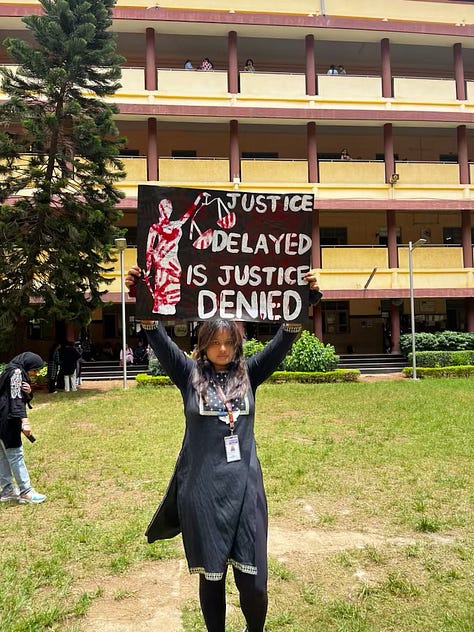
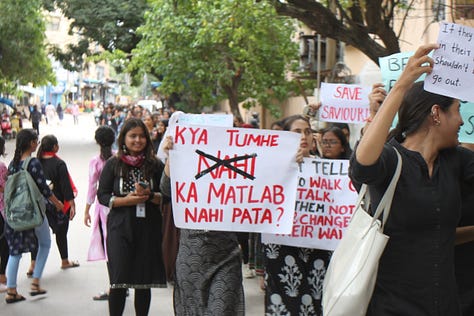
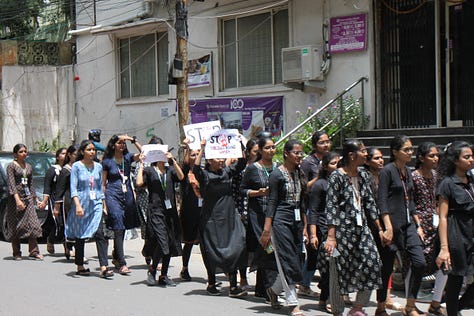
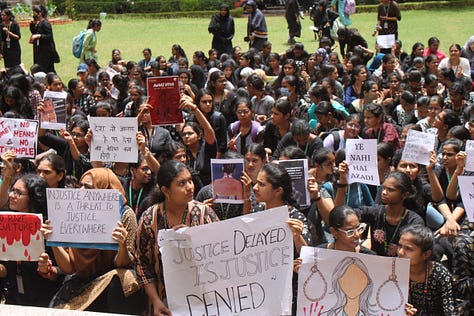

Our rally wasn’t just about this recent tragedy. It wasn’t just for the victims whose names we’ve come to know through headlines. It was for all of us who navigate this world with caution, who dream of a day when we won’t have to carry this fear. Our silence was deliberate. It wasn’t weakness—it was a powerful statement. We were holding space for the pain we’ve all felt, for the injustices we’ve witnessed and endured. We were demanding accountability—not just for the rapists and abusers, but for a society that allows this to continue unchecked.
As the rally came to a close, I knew we had made our voices heard, even without uttering a single word, it was for us to believe. But I also knew that this fight wasn’t over. It’s never just one protest, one rally, or one performance that brings about change. It’s a continuous battle—one we will keep fighting until our silence can truly transform into the freedom we all deserve.
And as we dispersed, I hoped that our silence wouldn’t be forgotten. I hoped that the strength we carried through the streets that day would resonate long after the posters were taken down. Because we’ve been silent for too long, and it’s time to reclaim our space—our rights, our dignity. This fight belongs to us, and we will not back down.






The depth you wrote shows the clarity you have in life, fearful writings inspires many, God bless you! -charlet
As always another great piece Aru!!!